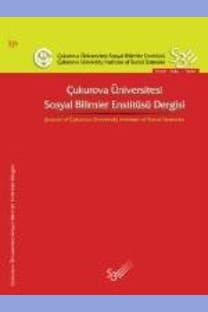Eu Citizenship As A Common Identity: Theoretical Underpinnings And Main Dimensions
AB vatandaşlığı, ortak siyasi kimlik, sosyal yapısalcılık
Eu Citizenship As A Common Identity: Theoretical Underpinnings And Main Dimensions
___
- Adler, Emanuel. 1997. "Seizing the Middle Ground: Constructivism in World Politics,"European Journal of International Relations 3 (3): 319-363.
- Black Annabel and Cris Shore. 1996. "Citizen's Europe and the Construction of European Identity," in Victoria A Goddard et al, eds., the Anthropology of Europe, 2nd edition, pp. 275-298. Oxford: Berg.
- Checkel, Jeffrey T. 1999a. "Social Construction and Integration," in Journal of European Public Policy 6 (4): 545-560.
- Christiansen, Thomas, Knud Erik Jorgensen and Antje Wiener. 1999. "The Social Construction of Europe," Journal of European Public Policy 6 (4): 528-545.
- Delanty, Gerard. 1995. Inventing Europe: Idea, Identity, Reality. London: Macmillan.
- Emerson, Michael. 1998. Redrawing the Map of Europe. London: Macmillan.
- Habermas, Jurgen. 1992. "Citizenship and National Identity: Some Reflections On the Future of Europe," in Praxis International 12 (1): 1-19.
- Habermas, Jurgen. 1994. "Citizenship and National Identity," Bart van Steenbergen,ed., The Condition of Citizenship pp. 20-36. London: Sage.
- Heater, Derek 1990. Citizenship: The Civic Ideal In World history, Politics and Education. London: Longman.
- Heater, Derek. 1992. The Idea of European Unity. Leicester: Leicester University Press.
- Hopf, Ted. 1998. "The Promise of Constructivism in International Relations Theory,'International Security," reprinted in Andrew Linklater, ed., International Relations: Critical Concepts in Political Science. 4: 1756-1783.
- Karlsson, Ingmar. 2000. "European Identity and the Enlargement of the European Union," in Christopher Lord, ed., Central Europe: Core or Periphery? pp. 167- 181. Copenhagen: Copenhagen Business School.
- Katzenstein, Peter J. 1996. "Introduction: Alternative Perspectives on National Security," in Peter Katzenstein, ed., The Culture of National Security, pp. 1-32.New York: Columbia University Press.
- Keane, John. 1992. "Questions for Europe," in Brian Nelson et al, eds., The Idea of Europe, pp. 55-61. Oxford: Berg.
- Koslowski, Rey. 1999. "A Constructivist Approach to Understanding the European Union as a Federal Polity," in Journal of European Public Policy 9 (4): 561- 578.
- Koslowski, Rey and Friedrich V. Kratochwil. 1994. "Understanding Change in International Politics: The Soviet Empire's Demise and the International System," in International Organization 48 (2): 215-247.
- Kostakopoulou, Theodora. 2001. Citizenship, Identity and Immigration in the European Union. Manchester: Manchester University Press.
- Laffan, Brigit. 1996. "The Politics of Identity and Political Order in Europe," in Journal of Common Market Studies 34 (1) 81-102.
- Lapid, Yosef. 1997. "Culture's Ship: Returns and Departures in International Relations Theory," in Yosef lapid and Friedrich Kratochwil, eds., The Return of Culture and Identity in IR Theory pp.3-21. London: Lynne Rienner Publishers.
- Meehan, Elizabeth. 1993. Citizenship and the European Union. London: Sage.
- Papcke, Sven. 1992. "Who Needs European Identity and What Could It Be?," in in Brian Nelson et al, eds., The Idea of Europe, pp. 61-75. Oxford: Berg.
- Peterson, John and Elizabeth Bomberg. 1999. Decision Making in the European Union.London: Macmillan.
- Radaelli, Claudio. 2001. "Conceptualising Europeanisation: Theories, Methods and the Challenge.of.Empirical Research".http://www.york.ac.uk/depts/poli/juc/2001/papers
- Rosamond, Ben. 2000. Theories of European Integration. London: Macmillan.
- Shore, Cris. 2000. Building Europe. London: Rourledge.
- Smith, Anthony. 1992. "National Identity and the Idea of European Unity," International Affairs 68 (1): 55-76.
- Tassin, Etienne. 1992. "Europe: A Political Community," in Chantal Mouffe, ed.,Dimensions of Radical Democracy pp. 169-193. London: Verso.
- Waever, Ole. 1995. "Identity, Integration and Security," in Journal of International Affairs 48 (2): 389-431.
- Waever, Ole. 1996. "European Security Identities," in Journal of Common Market Studies 34 (1): 103-130.
- Weiler, Joseph H.H. 1997a. "The Reformation of European Constitutionalism," Journal of Common Market Studies 35 (1): 97-131.
- Weiler, Joseph H. H. 1997b. "To Be A European Citizen-Eros and Civilization," in Journal of European Public Policy 4 (4): 495-519.
- Wendt, Alexander. 1997. "Identity and Structural Change in International Politics," in Yosef lapid and Friedrich Kratochwil, eds., The Return of Culture and Identity in IR Theory pp. 47-64. London: Lynne Rienner Publishers.
- Wendt, Alexander. 1999. Social Theory of International Politics. Cambridge: Cambridge University Press.
- ISSN: 1304-8880
- Yayın Aralığı: 2
- Başlangıç: 2013
- Yayıncı: Çukurova Üniversitesi Sosyal Bilimler Enstitüsü Dergisi
ÇOCUK EĞİTİMİNDE MONTESSORİ YAKLAŞIMI
Bil. Uzm. Vuslat OĞUZ, Doç. Dr. Aysel Köksal AKYOL
BÜYÜK EBEVEYNLERİYLE YAŞAYAN ÇOCUKLARIN AİLE ORTAMLARINI DEĞERLENDİRMELERİ
Doç. Dr. Figen GÜRSOY, Tuğba COŞKUN
FOTOĞRAF VE RENK: FOTOĞRAFTAKİ RENKLERİN İLETİLERİN ALGILANMASINDAKİ ROLLERİ
YEREL YÖNETİMLERİN KONUT POLİTİKALARI ÜZERİNE BİR İNCELEME - ÇEŞİTLİ ÜLKE DENEYİMLERİ VE TÜRKİYE
Yrd. Doç. Dr. Selim KILIÇ, Yrd. Doç. Dr. Mehmet ÖZEL
Refreshment In The Literature Classroom
E retailing: A Preliminary Look At Turkish Customers Expectations And Satisfaction
Vichuda Nui POLATOGLU, Ayse HEPKUL
FENER PATRİKHANESİ VE EKÜMENİZM: DİNLER TARİHİ AÇISINDAN BİR ANALİZ
ALMANPINARI KIRMIZI KİLİNİN SERAMİKTE BOYA OLARAK KULLANILABİLİRLİĞİNİN ARAŞTIRILMASI
